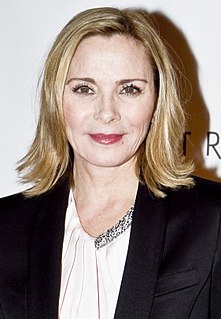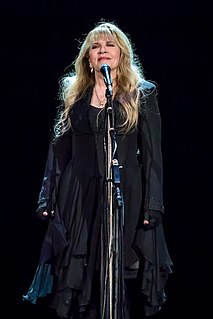A Quote by Kim Cattrall
When I see a woman who looks her age, she's radiating something, and it's life.
Related Quotes
I try to see the whole woman,' Eddie said to Hannah. 'Of course I recognize that she's old, but there are photographs - or the equivalent of photographs in one's imagination of anyone's life. A whole life, I mean. I can picture her when she was much younger than I am - because there are always gestures and expressions that are ingrained, ageless. An old woman doesn't see herself as an old woman, and neither do I. I try to see her her whole life in her. There's something so moving about someone's whole life.
She was beautiful, but not like those girls in the magazines. She was beautiful, for the way she thought. She was beautiful, for the sparkle in her eyes when she talked about something she loved. She was beautiful, for her ability to make other people smile, even if she was sad. No, she wasn't beautiful for something as temporary as her looks. She was beautiful, deep down to her soul. She is beautiful.
Even after the age of 50 it was impossible for me to see my mother as a human being. I felt she was a monster, and she had subtly been influencing my behavior and my thoughts and my dreams for so long that she was kind of a monster; she was a demon. And when I brought her back to life, I could feel that malevolent presence around me again, that woman who was totally incapable of giving nurturing to anybody, and, you know, her selfishness and her withdrawn indifference to everything but her own needs.
Sophie has a gift," she said. "She has the Sight. She can see what others do not. In her old life she often wondered if she was mad. Now she knows that she is not mad but special. There, she was only a parlor maid, who would likely have lost her position once her looks had faded. Now she is a valued member of our household, a gifted girl with much to contribute.
Was there another life she was meant to be living? At times she felt a keen certainty that there was ? a phantom life, taunting her from just out of reach. A sense would come over her while she was drawing or walking, and once while she was dancing slow and close with Kaz, that she was supposed to be doing something else with her hands, with her legs, with her body. Something else. Something else. Something else.
The extraordinary woman depends on the ordinary woman. It is only when we know what were the conditions of the average woman's life - the number of children, whether she had money of her own, if she had a room to herself, whether she had help bringing up her family, if she had servants, whether part of the housework was her task - it is only when we can measure the way of life and experience made possible to the ordinary woman that we can account for the success or failure of the extraordinary woman as a writer.
When I see Kate Moss out and about, I think she looks more beautiful than when her hairdresser and make-up artist try and make her look like something else. And I remember when Madonna first asked Versace to book me to shoot a campaign with her, she came to see me wearing hardly any make-up, and she looked incredible.
In domestic life the woman's value is inherent, unquantifiable; at home she exchanges proven values for mythological ones. She "wants" to be at home, and because she is a woman she's allowed to want it. This desire is her mystique, it is both what enables her to domesticate herself and what disempowers her.
In domestic life, the woman's value is inherent, unquantifiable; at home she exchanges proven values for mythological ones. She 'wants' to be at home, and because she is a woman, she's allowed to want it. This desire is her mystique, it is both what enables her to domesticate herself and what disempowers her.
As one woman told me, "When I decided to come in to work happy, everybody around me became happy." This woman had decided to quit a job she hated, and on the last day of her two weeks' notice, she woke up happy. At the end of the day, she noticed that everybody around her was happy, too- so she didn't quit after all. She decided to come to work happy instead. Two years later, she's still on the job, radiating happiness and love.



































